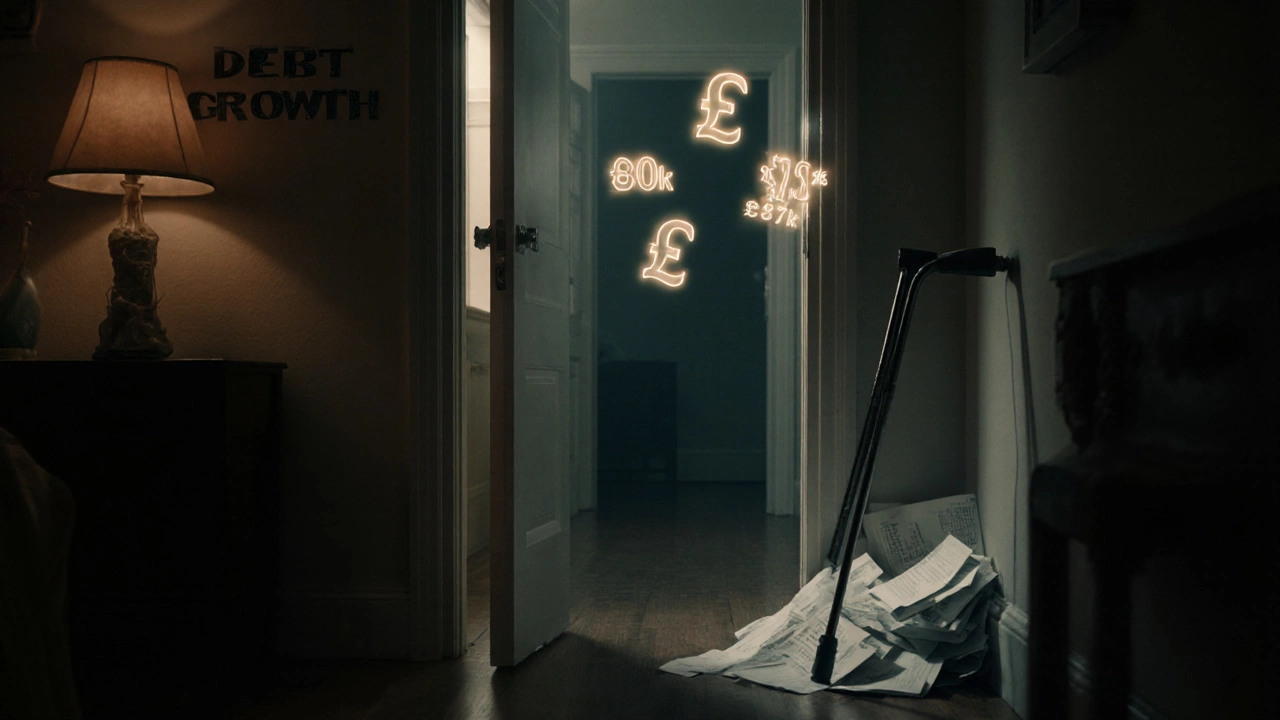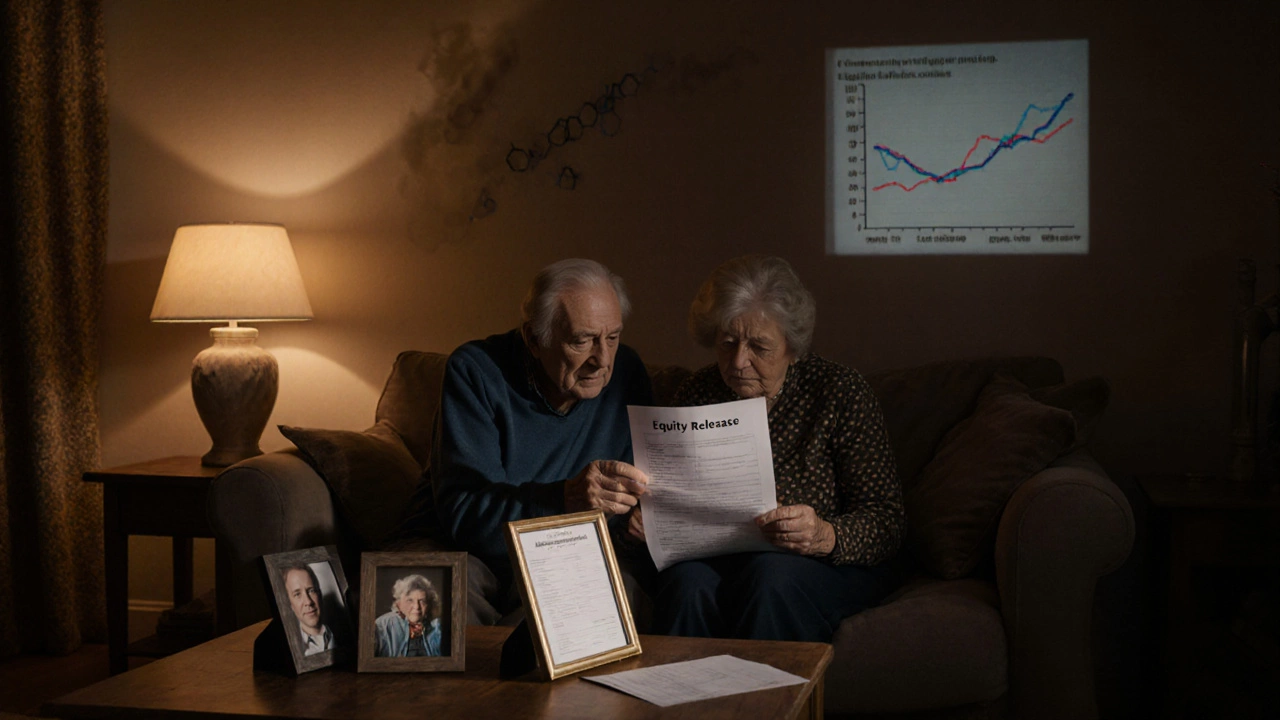Equity Release Cost Calculator
Calculate how much your equity release loan could cost over time. This tool shows how compound interest grows your debt and what it means for your home's value and inheritance.
Enter values above to see how your equity release debt could grow over time.
Equity release lets homeowners over 55 turn their home’s value into cash without moving. Sounds simple, right? But behind the promise of extra money for travel, home repairs, or helping family, there are serious downsides most people don’t talk about until it’s too late.
You’re Giving Up Part of Your Home’s Future Value
When you take out an equity release plan, you’re not borrowing money-you’re selling a piece of your home. Even if you keep living there, the lender owns a share. That share grows over time because interest compounds. In 10 years, what started as 20% of your home’s value could become 50%, 60%, or more. By the time you pass away or move into care, your estate might have almost nothing left.
One woman in Kent released £80,000 in 2018. Her home was worth £320,000 then. By 2025, with compound interest added, the debt had ballooned to £195,000. Her home sold for £410,000. After paying off the loan, her children got £215,000-less than half of what the house had gained in value. That’s not inheritance. That’s a financial trade-off you didn’t fully understand.
It Can Hurt Your Eligibility for State Benefits
That lump sum or monthly payment you get? It counts as savings or income. If you’re on means-tested benefits like Pension Credit, Council Tax Reduction, or Attendance Allowance, even £10,000 extra in your bank account can cut or cancel your support.
In 2024, a man in Yorkshire released £50,000 to pay off his car and fund holidays. Within three months, his Pension Credit stopped. He lost £1,200 a year in benefits. He ended up paying more in lost support than he gained from the equity release. He couldn’t get the benefits back, even after spending the cash.
There’s no easy way around this. Even if you spend the money quickly, benefit agencies look at your finances over time. If you’re planning to claim benefits in the future, equity release can lock you out for good.
Interest Rates Are High-and They Keep Rising
Equity release loans aren’t like regular mortgages. They’re lifetime mortgages, and interest compounds. That means you’re paying interest on interest. The average rate in 2025 is 6.8%, but some deals go over 8%. That’s more than double the rate on a standard home loan.
Compare that to a 25-year fixed-rate mortgage at 3.5%. In 20 years, a £100,000 mortgage would grow to about £199,000 with compound interest. A £100,000 equity release loan at 7%? It becomes £387,000. That’s nearly four times the original amount.
And you can’t fix this. Even if you choose a fixed-rate plan, the rate is locked in for life. If market rates drop, you’re stuck. If they rise? You pay more. There’s no refinancing option like with a traditional mortgage.
You Lose Flexibility to Move or Downsize
What if you want to move closer to family? Or downsize to a bungalow because stairs are getting hard? With equity release, you can’t just sell and move. You have to repay the full loan-plus fees-before you leave. That means finding the cash to pay off a debt that’s grown over time.
One couple in Devon wanted to move to a retirement village in 2023. They’d released £60,000 five years earlier. The debt had grown to £92,000. Their new home cost £180,000. They had to borrow another £32,000 just to cover the repayment. They ended up paying more in interest and fees than they saved on moving costs.
Most equity release plans don’t allow partial repayments. Even if you come into money, you can’t pay down the debt early without paying heavy penalties-often 25% of the amount you want to repay.

It Can Strain Family Relationships
Many people use equity release to help children with deposits or pay for grandchildren’s education. It feels generous. But it often backfires.
A father in Birmingham released £120,000 to help his daughter buy a flat. He didn’t tell his other two children. When he passed away, the house sold for £400,000. After paying off the loan (£175,000), the remaining £225,000 was split between the three kids. The daughter got her deposit back-plus a share. The other two felt cheated. One stopped speaking to their father before he died.
Equity release isn’t just a financial decision. It’s a family decision. If you don’t talk openly, you risk creating resentment, guilt, or legal battles after you’re gone.
There Are Hidden Fees and Complex Terms
Advertised rates often hide the real cost. Setup fees can be £2,000-£4,000. Solicitor fees, valuation fees, advice fees-all add up. Some providers charge annual management fees. Others charge for switching plans later.
One man in Manchester took out a plan in 2020. He thought he was getting a “no-fee” deal. Turns out, the lender added a £3,500 arrangement fee to the loan. That fee then compounded at 7.2% for five years. By 2025, that £3,500 had grown to £4,900. He didn’t know until his solicitor flagged it.
And the fine print? It’s full of traps. Some plans require you to keep the property insured and maintained. If you don’t, the lender can demand repayment. Others restrict who can live with you. If your adult child moves in, you might break the terms.
You Might Not Get the Best Deal
There are over 150 equity release products on the market. But most people go with the first offer they get from their bank or a TV-advertised provider. These aren’t always the best.
Two identical homeowners in Surrey applied for equity release. One went through a broker who checked 30 lenders. The other used their high street bank. The broker found a plan with a 5.9% rate, £1,200 in fees, and flexible repayment options. The bank offered 7.1%, £3,800 in fees, and no early repayment option. The difference? Over £120,000 in debt after 20 years.
Only 12% of people use a specialist equity release adviser. The rest rely on salespeople who earn commissions. That’s like buying a car from someone who gets paid when you choose the most expensive model.

What Happens If You Need Long-Term Care?
If you need to move into a care home, your equity release plan triggers repayment. That means your home must be sold. But care homes are expensive-£1,200 to £2,500 a month. If your home sells for £300,000 and your debt is £200,000, you’re left with £100,000 for care. That’s barely four years.
Some plans let you delay repayment if you stay in your home, but if your health declines and you need round-the-clock care, the lender will step in. You won’t get to choose when or how you leave.
And if you’re married? If your partner doesn’t have the equity release plan in their name, they could be forced out of the home after you die-even if they’ve lived there for 40 years.
There Are Better Alternatives
Before you sign anything, ask: Is this really the only option?
- Selling and downsizing: Move to a smaller home, pocket the difference, and keep your mortgage low.
- Part-time work: Even 15 hours a week at £12/hour adds £9,360 a year-tax-free if you’re over state pension age.
- Reverse mortgage alternatives: Some credit unions and co-ops offer low-interest home equity loans with fixed terms and no compounding interest.
- Family loans: If your children can afford it, a formal, written loan with no interest might be better than a lifetime debt.
One widow in Wales sold her three-bedroom house for £310,000 and bought a bungalow for £180,000. She used the £130,000 difference to fund her retirement. No debt. No interest. No risk to her children’s inheritance. She’s happier now than she was with her equity release plan.
Final Thought: Is the Cash Worth the Cost?
Equity release isn’t evil. For some, it’s the only way to live comfortably in later life. But it’s not a free lunch. You’re trading security for cash, legacy for spending, and control for convenience.
If you’re considering it, get advice from a regulated equity release adviser-not a bank sales rep. Ask for a full illustration showing your debt in 10, 15, and 20 years. Talk to your family. Compare at least three options. And ask yourself: Will this help me live better-or just delay a bigger problem?
There’s no rush. Your home isn’t going anywhere. But the debt you take on today will outlive you.
Can you lose your home with equity release?
No, you won’t be forced out as long as you live in the property and meet the terms-like keeping it insured and maintained. But if you move out permanently, enter long-term care, or break the agreement, the lender can demand repayment. If you can’t pay, your home will be sold.
Do your children inherit anything after equity release?
It depends. If your home sells for more than the debt, your estate gets the rest. But because interest compounds over time, many estates end up with little or nothing. In 2024, 62% of equity release cases left less than £50,000 for heirs after debt repayment.
Can you pay back equity release early?
Some plans allow it, but most charge high penalties-often 25% of the amount repaid. Even if you come into money, it’s rarely worth it financially. The compounding interest makes early repayment expensive unless you pay off the full balance early in the loan term.
Is equity release regulated in the UK?
Yes. All equity release products must be offered by firms regulated by the Financial Conduct Authority (FCA). Advisers must be members of the Equity Release Council and follow strict rules on transparency, affordability checks, and independent advice. Always check the FCA register before signing anything.
What’s the minimum age for equity release?
The minimum age is 55 for most plans, though some providers require you to be 60 or older. The older you are, the more you can typically release-because the loan term is shorter and risk is lower for the lender.
Can you get equity release if you still have a mortgage?
Yes, but you must use the equity release funds to pay off your existing mortgage first. You can’t have two loans on the same property. Most lenders require your existing mortgage to be cleared before they approve the equity release plan.
How does equity release affect your tax bill?
The money you receive is tax-free because it’s a loan against your home’s value, not income. But if you invest it and earn interest or dividends, those earnings may be taxable. Also, if your savings grow above £23,250, you could lose means-tested benefits.
What happens if property values drop?
With a regulated equity release plan, you won’t owe more than your home’s value. This is called a ‘no negative equity guarantee.’ Even if your house falls in price, your debt won’t exceed what the property sells for. Your estate won’t be left with a shortfall.
If you’re thinking about equity release, don’t rush. The cash feels good now. But the cost? It grows silently, year after year. And when it comes time to settle, it’s your family who’ll feel the weight.

